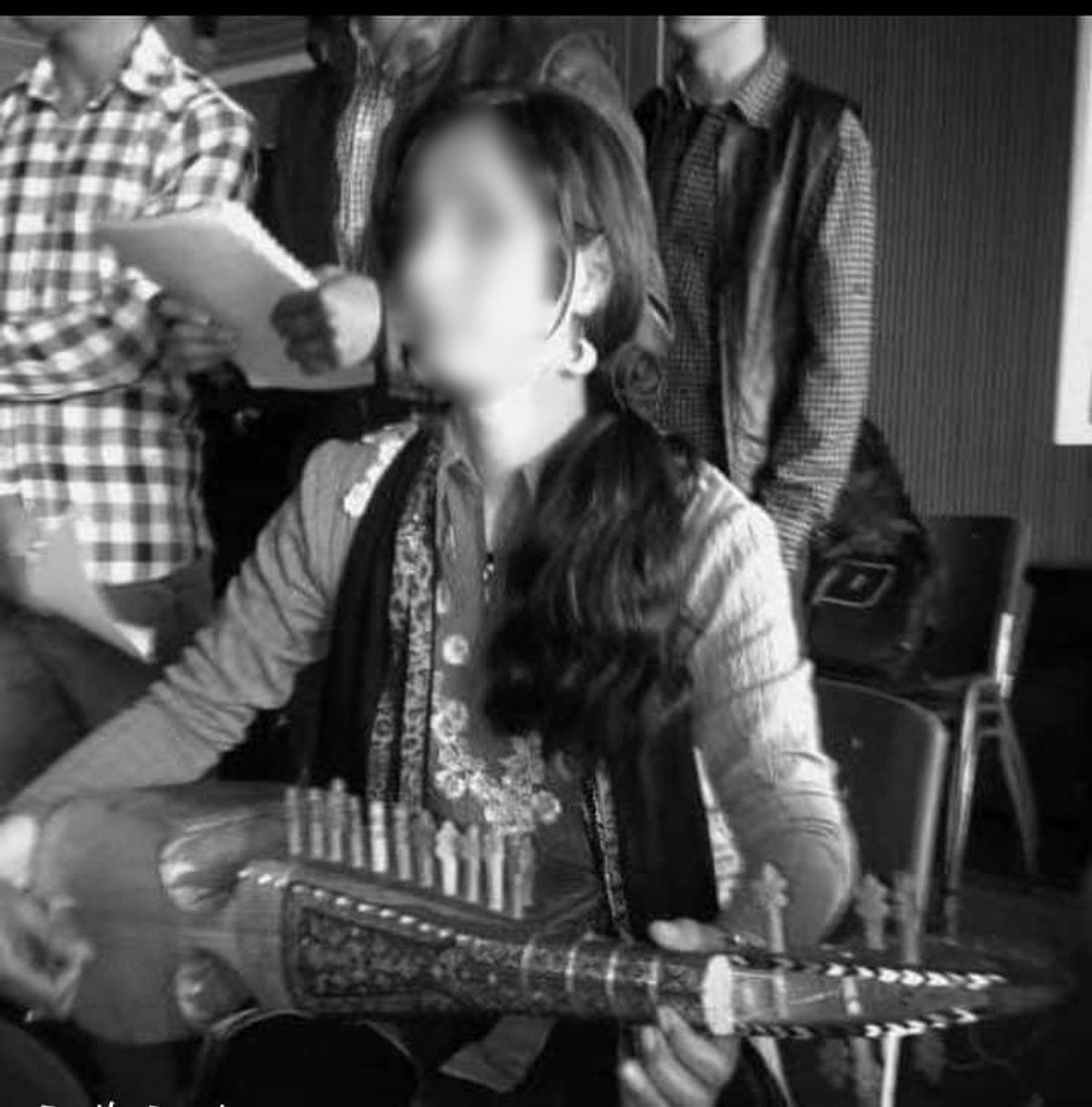This article is part of an ongoing series "Dispatches from Afghanistan" profiling Afghan artists and their experiences since the rise of the Taliban. Find all of the profiles so far here and a list of resources to help Afghan creatives here.
Lying on her makeshift bed in her hiding place, attached to an IV, jobless, terrified and hopeless is not the future Sima had envisioned for herself just a couple of months ago. But her whole world was turned upside down on 15 August, when the Taliban took over Kabul and resumed control of Afghanistan.
Sima had spent her life breaking barriers in Afghanistan’s traditional society by insisting on playing and teaching the rubab, an Afghan stringed instrument, despite the dangers it presented to her and her family. Extremists viewed music as Western and anti-Islamic. Women playing musical instruments was considered even more offensive and strongly opposed. Even families who did not share those ideologies often prevented their children, especially girls, from playing instruments to protect them from the abuse and possible assaults they could suffer at the hands of radicals in their communities.
Sima convinced her family not to give into social pressures and allow her to follow her passion for music, which they cautiously respected. Music became her whole world and she spent her days working within the field in one form or another; consulting, playing events and teaching, encouraging young women and girls in particular to participate.
“Afghanistan is a very traditional country and women have been deprived of opportunities in music and kept away from it for years. I really wanted to help girls and young women learn and play music, so that it could be more widespread and this negative mentality towards it could be abolished,” a dejected Sima tells The Art Newspaper from Afghanistan. "I wanted them to have a positive outlook towards music and understand that women could be active in music and arts."
Sima confesses she has spent the majority of her time in tears in recent weeks: “All the things I thought could be possible have turned out to be nothing more than dreams and everything has been destroyed.”
Despite trying to find ways to escape the country, Sima has been unable to find a way out. One organisation agreed to put her on their evacuation list but they would only include her name and not her family, which was an impossible situation for her. “How can I leave without my family? They are all in danger," Sima explains. "What kind of life will I have if I leave and something happens to them?”
She knew her fate of being stuck in Afghanistan was sealed when an explosion by a suicide bomber rocked Kabul airport, killing at least 170 Afghans and 13 US military service members, putting a dent in the remaining evacuation plans. To prepare for her life under the Taliban she put on a burqa to hide her identity and, with the help of her family, moved her musical instruments to a safe place far away. Then she went into hiding.
Over the years Sima and her family had been threatened on a number of occasions and warned that they would be killed if she did not stop performing. With the Taliban now in charge she is frightened that those intimidations will be elevated to new levels.
Her fears are not unfounded. Around ten days into their rule, a Taliban spokesman told the New York Times in an interview that they planned to ban music because it was prohibited in Islam. A few days later, the folk singer Fawad Andarabi was dragged from his house and shot dead in the Andarab Valley. Sima says she and other artists saw the move as a warning.
“Afghanistan is not a place for artists anymore, especially women and women in music. It is impossible for women in music to now have a future in this country”
“Last time the Taliban were in power they banned all music, wrecked instruments and if they found anyone with a musical instrument they tortured the person and even killed them. This really destroyed the music scene in Afghanistan and many people were hurt. We have no reason to believe they are any different this time,” she says.
Separated from her music, housebound with nothing to do but stare at the walls, Sima has no income and worries that her and her family will be forced to sell their belongings to buy food, like so many other Afghans around the country. Her abysmal situation has made her depressed, anxious, sleep deprived and suffering with an irregular heartbeat. Unable to visit a doctor, a family member with a medical background has been discreetly treating her.
“Afghanistan is not a place for artists anymore, especially women and women in music. It is impossible for women in music to now have a future in this country,” she says. “Music, photography, cinema, painting, writing, poetry are all art forms that represent the culture of a country. If music and arts are banned—which they are under the Taliban—then I think half our culture is demolished. This is worrying and completely unacceptable for me and the entire community here,” she says.
Asked if she has any message for the international community she asks that immigration laws be amended to save their lives. “I hope people in the art world can at least help us. Help us leave this place. We are in grave danger here,” she says.
This article is part of an ongoing series "Dispatches from Afghanistan" profiling Afghan artists and their experiences since the rise of the Taliban. Find all of the profiles so far here and a list of resources to help Afghan creatives here.


